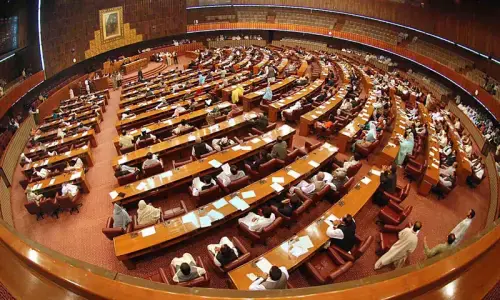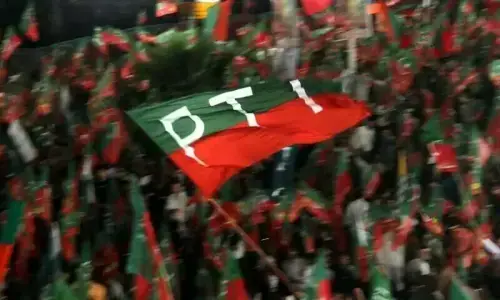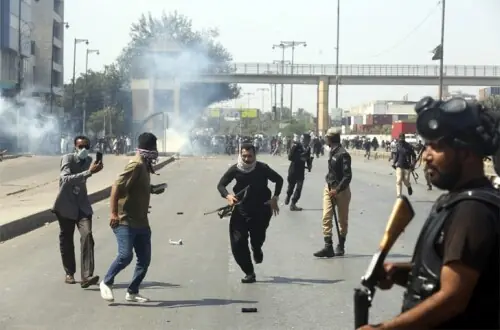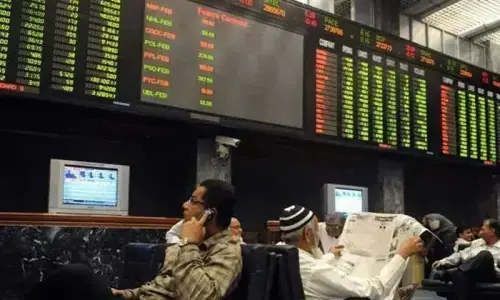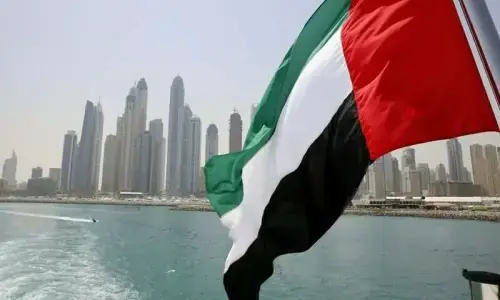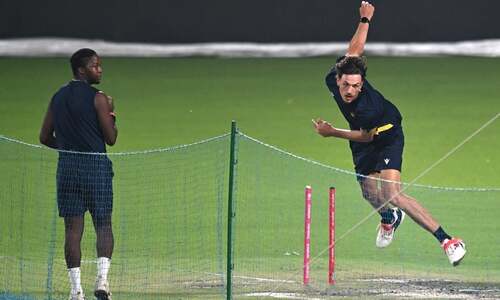
LADHA: Mohammad Ilyas Kashmiri, the commander of Harkat-ul Jihad al Islami (HuJI), who was believed to have masterminded the attack on the naval base in Karachi, was killed in a US drone attack near Wana, South Waziristan, on Friday night, officials said.
Shoaib Khan, a political agent, confirmed that Kashmiri had died in the strike at a militant compound in Ghwa Khwa area. An official said Ilyas Kashmiri had been seen in South Waziristan a couple of days ago.
“Kashmiri was killed in the late night attack,” Mr Khan told journalists on Saturday. A statement, purportedly distributed by HuJI in Wana on Saturday afternoon, confirmed the killing of its supremo with eight other militants in the drone attack. Washington had put a bounty of $5 million on his head under a “reward for justice” programme.
“Commander Ilyas Kashmiri has been killed along with his companions,” the one-page statement said. The group held Washington responsible for his assassination and warned that they would avenge his killing. “America is our main target,” it said.
Lala Wazir, a spokesman for the influential militant commander Mullah Nazir in South Waziristan, also came up with a statement verifying the death of Ilyas Kashmiri.
Kashmiri was mistakenly pronounced dead in a US drone strike in North Waziristan in September 2009, but just one month later his interview was conducted by Saleem Shehzad, whose body was found near Islamabad five days ago.
Sources said the US drone fired three missiles at a compound in Ghwa Khwa, 20km south of Wana, at around 11pm on Friday.
The compound belonged to a tribesman, Mir Ajam Khan Tozikhel who is an associate of the Mullah Nazir group.
The missiles hit two rooms in the compound. The sources said that nine people, most of them hailing from Punjab, were killed. Political authorities said five of the dead had been identified as Usman, Ibrahim, Farooq, Amir Hamza and Imran.
Amir Hamza was stated to be a close associate of Mullah Nazir.
Alamgir, a tribesman who hails from Ghwa Khwa, said militants had encircled the area and did not allow local people to take part in rescue work. He said all the dead were buried in the nearby Karikot.
“Taliban said that Ilyas Kashmiri has also been killed in the late night missile attack,” he said, quoting unnamed militants.
Sources said that Kashmiri had recently visited North Waziristan. They said the HuJI commander had close contacts with local militants, including Mullah Nazir.
According to US officials, Kashmiri used to provide logistical support to Al Qaeda and also coordinated attacks against Pakistani installations, including a strike at an ISI office in 2009.
Agencies add: Kashmiri, 47, was one of the most feared operational commanders of the network that Osama bin Laden founded and had been blamed for a string of high-profile attacks on western targets, as well as in Pakistan and India.
A Pakistani official said there were “strong indications” that Kashmiri had been killed, but that it was impossible to provide 100 per cent confirmation.
The corpses were burnt beyond recognition and swiftly buried.
Officials said Kashmiri had been in the area for several days and that all those killed were fighters in his HuJI organisation.
“Two of his close associates, Amir Hamza and Mohammad Usman, were killed in this drone strike. They usually travelled with him,” another official said.
The officials said Kashmiri had been in the area to discuss the strategy should Islamabad launch an offensive in North Waziristan, as has been predicted as part of the fallout surrounding Bin Laden’s killing.
Regional and anti-terrorism experts have long described Kashmiri as one of Al Qaeda’s main operational commanders.
Kashmiri was held responsible for a number of attacks in Pakistan, including the May 22 siege on the Navy’s air base in Karachi and in October 2009 on the General Headquarters in Rawalpindi.
HuJI was believed by the United States to be behind the March 2006 suicide bombing of the US consulate in Karachi which killed four people and wounded 48.
The US Department of State labelled Kashmiri a “specially designated global terrorist”, adding him to a list of high-profile militants.
In March last year, the US attorney’s office quoted in a statement a Chicago taxi driver charged with sending money to Kashmiri as saying the Pakistani militant told him he “wanted to train operatives to conduct attacks in the United States”.
Counter-terrorism officials believe he was the main coordinator of a terror plot targeting Britain, France, Germany and the United States, which was apparently in the early stages when detected by intelligence agencies last year.
Kashmiri’s family in the village of Thathi in Bhimber district, more than nine hours’ drive from Muzaffarabad, the capital of Azad Kashmir, said on Saturday they had not been in touch with him for six years.
“We came to know through TV. We don’t know whether he is dead or alive,” his elder brother Mohammad Asghar said.
TTP’s CLAIM A spokesman for the Tehrik-i-Taliban Pakistan (TTP) said Kashmiri was “alive and safe”, and had not been present at the time of the strike.
In January last year, a US federal grand jury indicted him for terrorism-related offences in connection with a plot to attack Danish newspaper Jyllands-Posten following the uproar over blasphemous sketches.
Listed on US and UN terror blacklists, Kashmiri was born in 1964 in Azad Kashmir. He was about six feet tall and weighed about 200 pounds.
He had black hair and been seen with a thick beard dyed white, black, or red at various times.He lost sight in one eye, and often wore aviator-style sunglasses. He had also lost an index finger, according to the US State Department.

